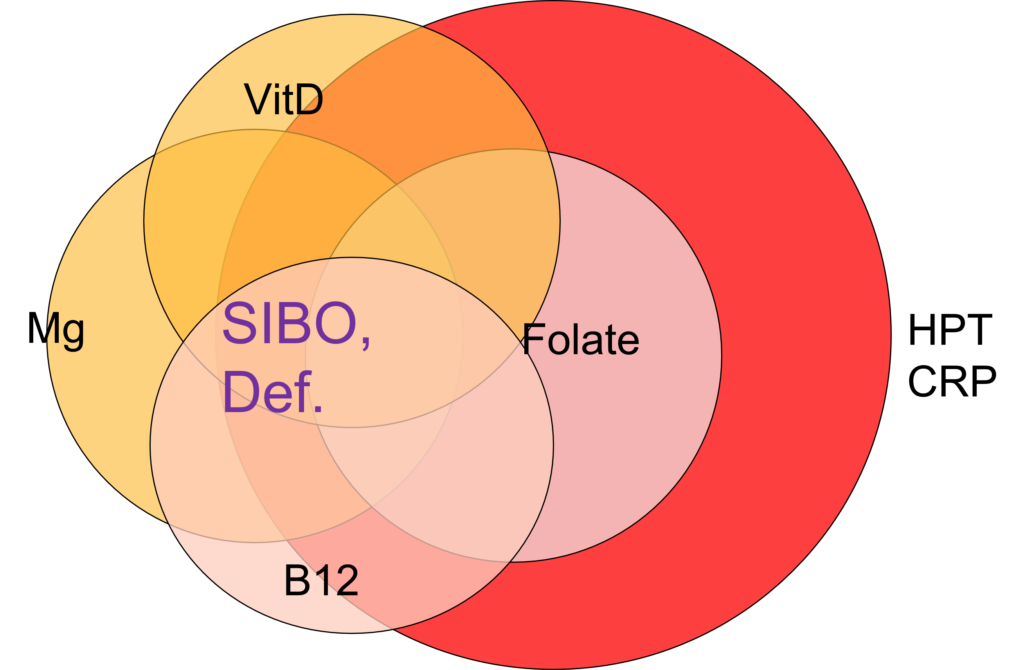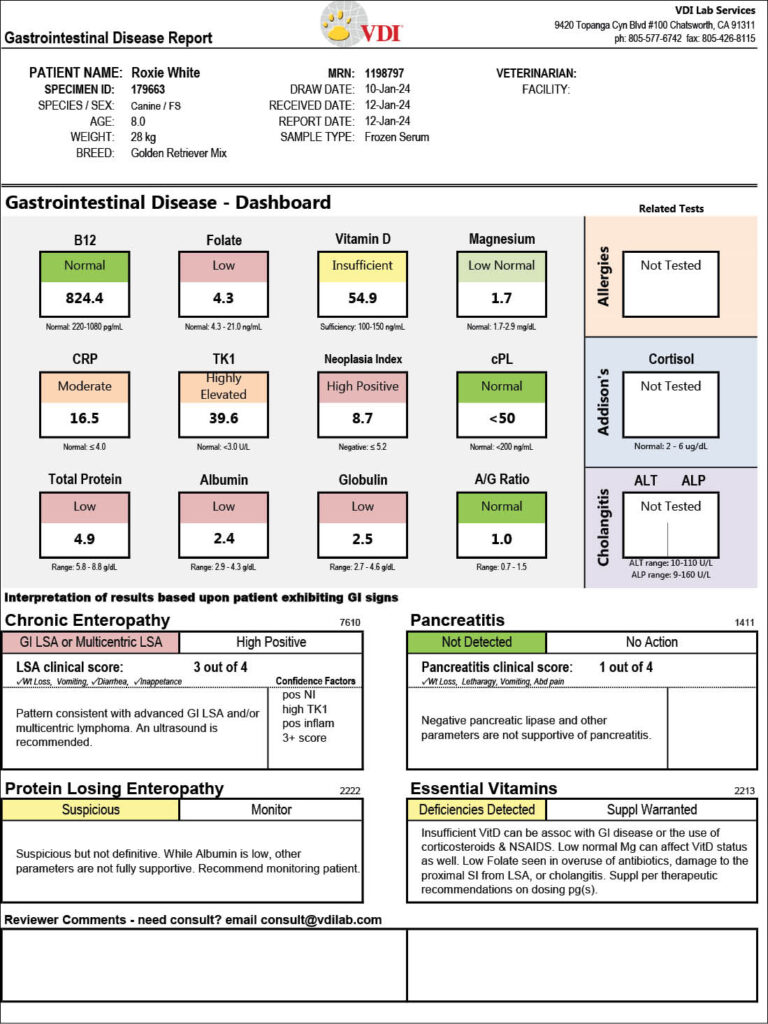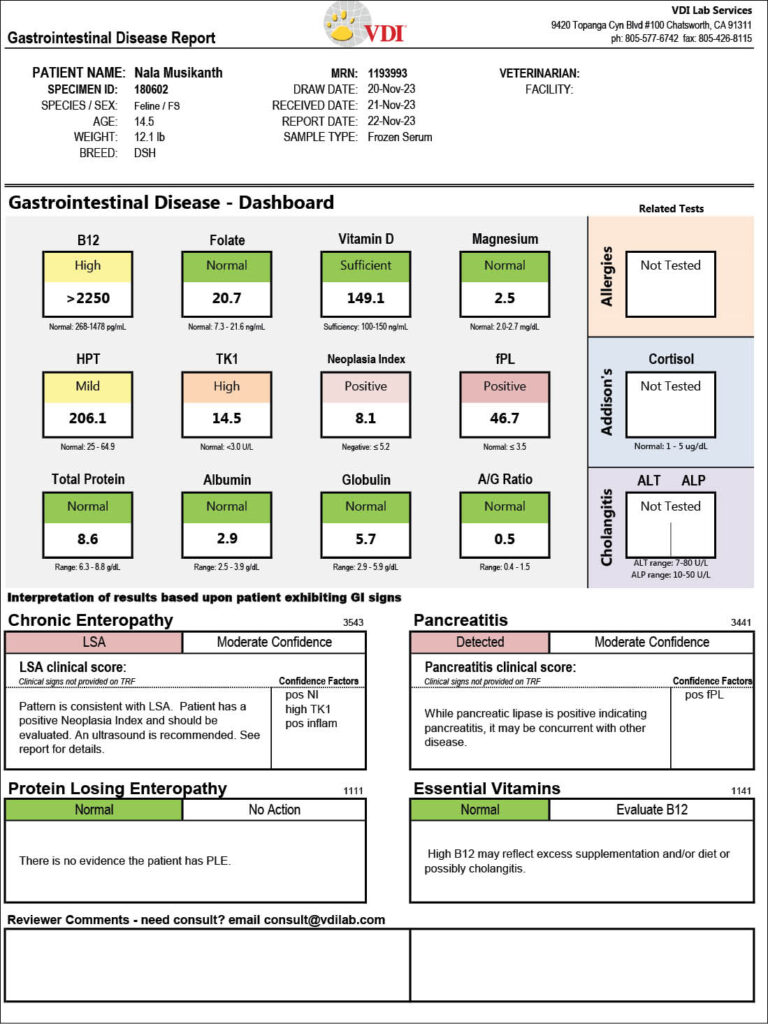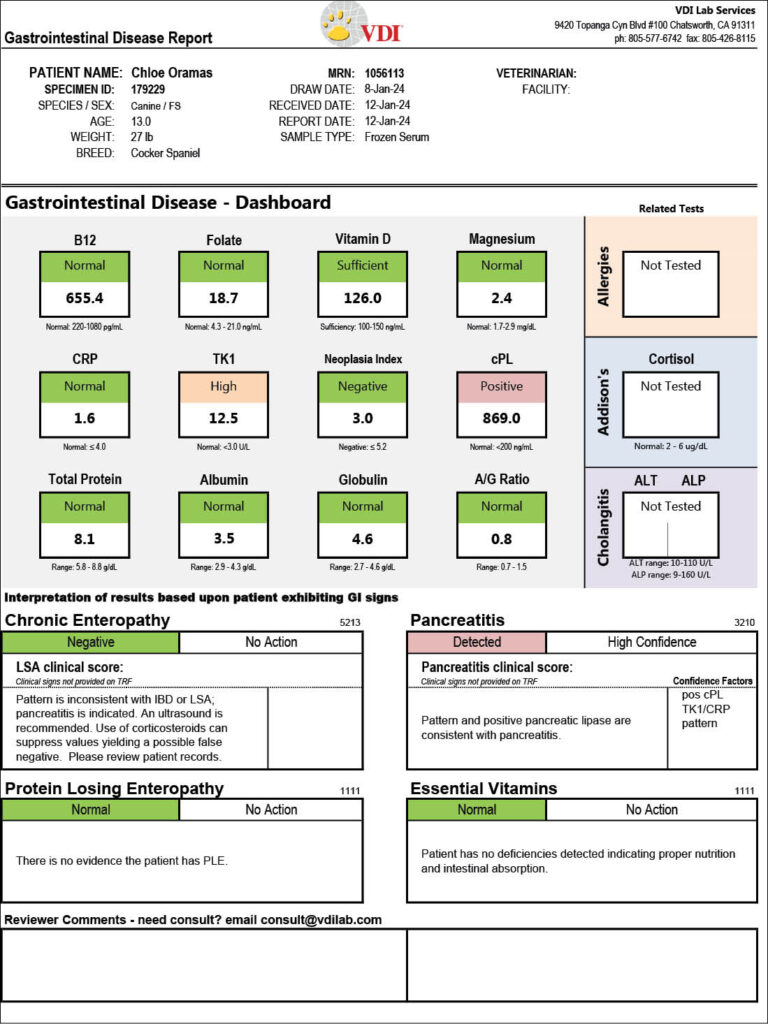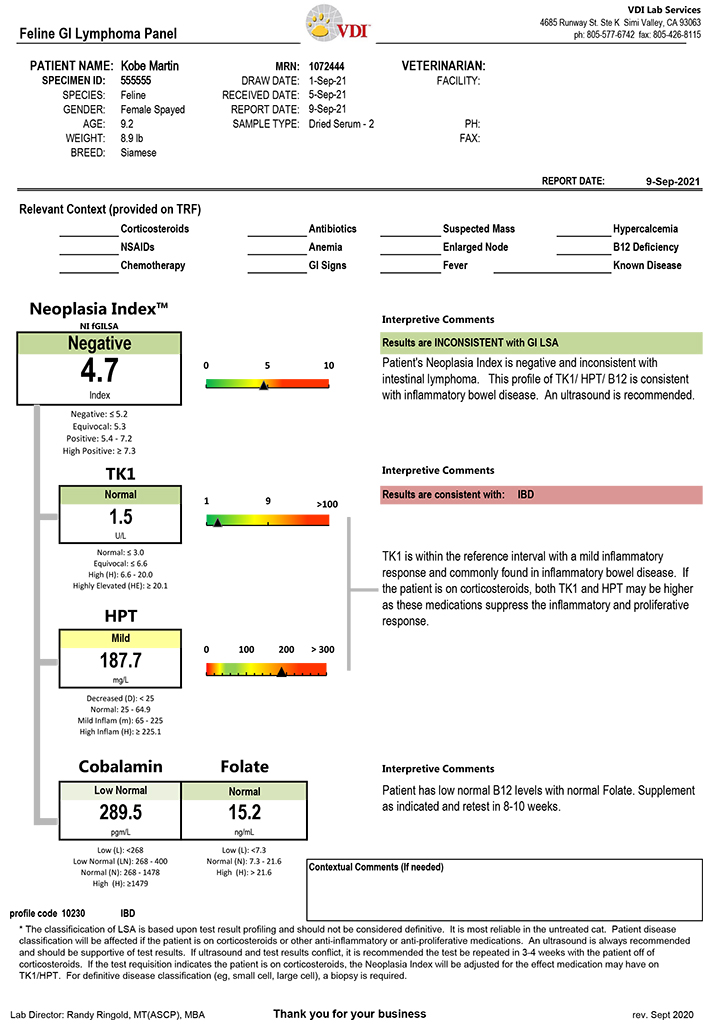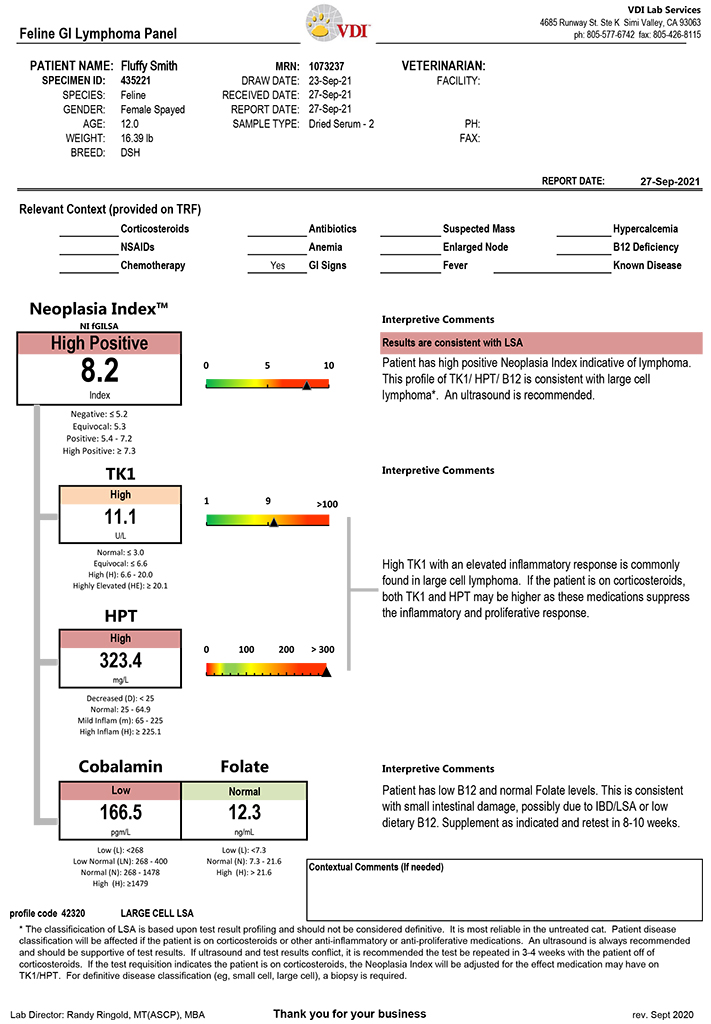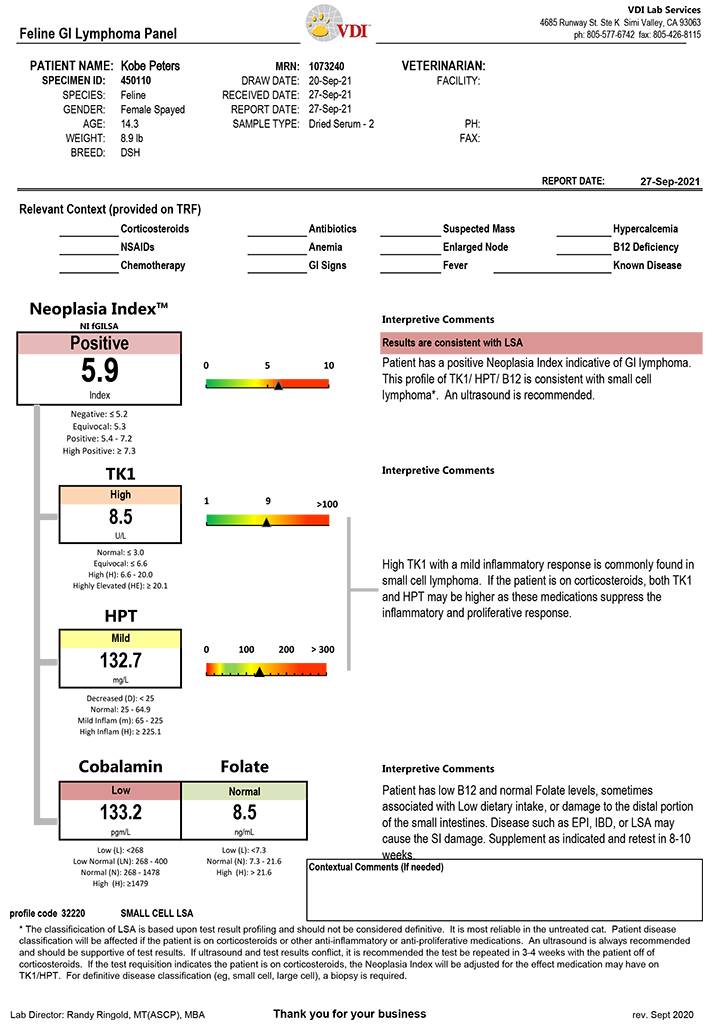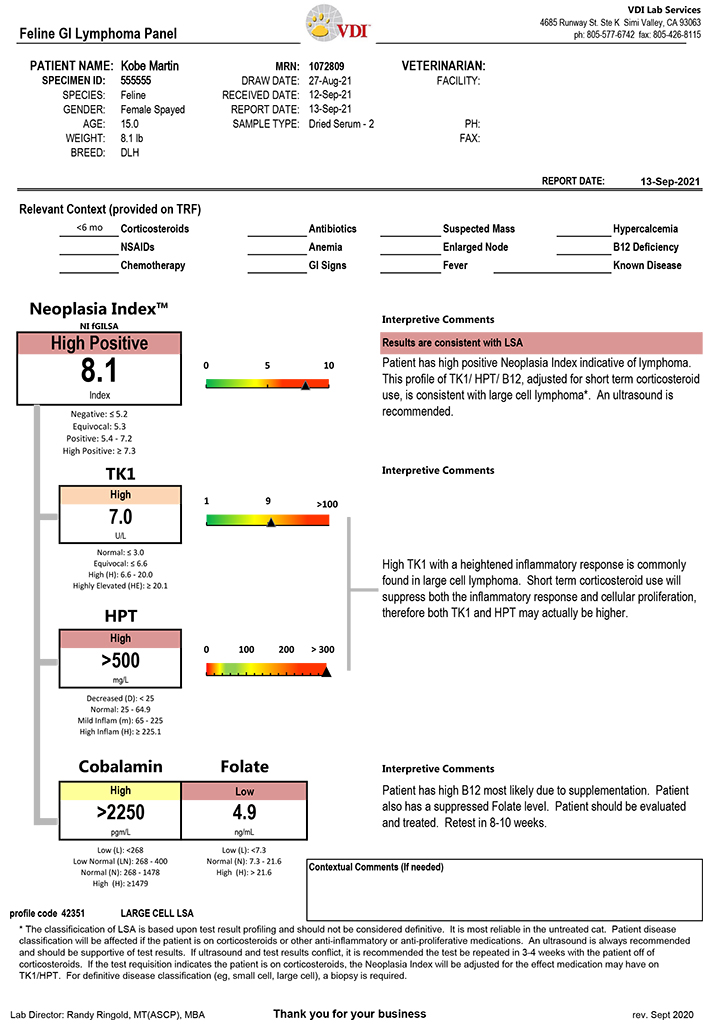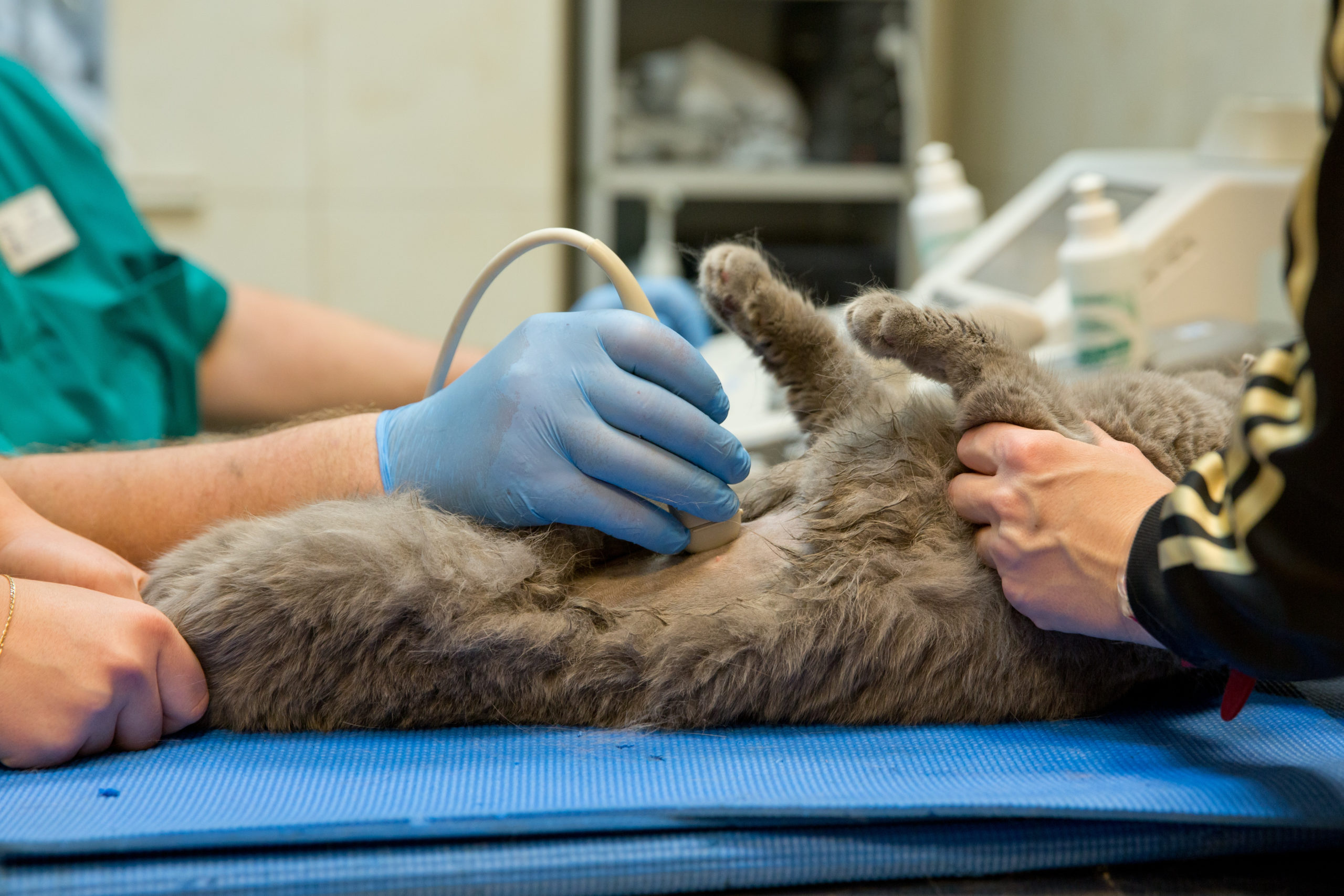
Advanced GI Panel
What’s wrong with this GI cat or dog? Differentiate GI diseases using a single blood panel for IBD, LSA, Pancreatitis, PLE and Vitamin Deficiencies.
A Simple Blood Panel for a Complex Problem
Patients presenting with gastrointestinal signs can be a challenging workup as the disease pathology can be multi-factorial. Diseases such as IBD, pancreatitis, PLE, LSA, SIBO may exist concurrently so no ONE TEST can do it all.
VDI Lab has assembled and integrated a unique array of tests to help identify what the exact problem is using a single blood panel. Being a simple blood draw means it’s NON-INVASIVE, COST-EFFECTIVE, and useful for initial workup and therapeutic monitoring.
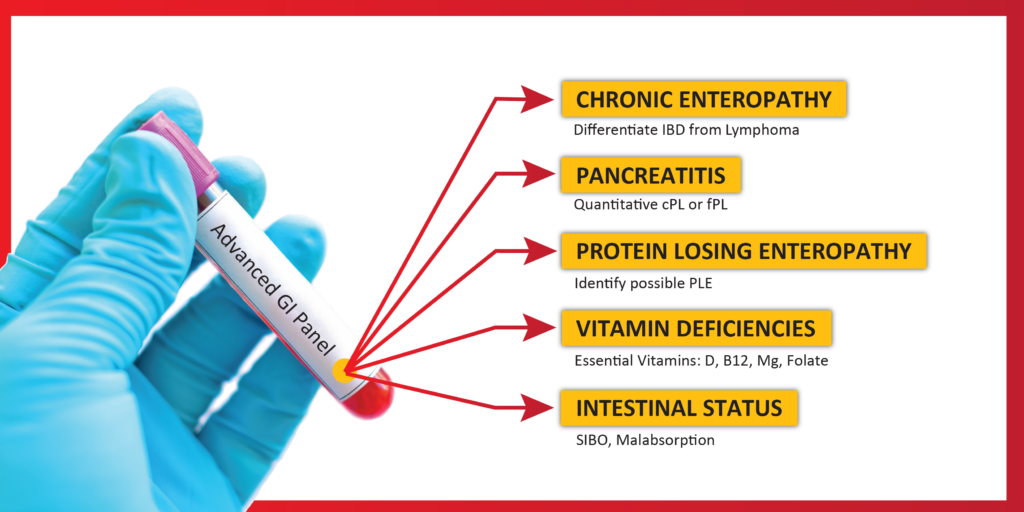
Compare Panels
The Advanced GI Panel gives you more information from a single blood test than your reference lab option.
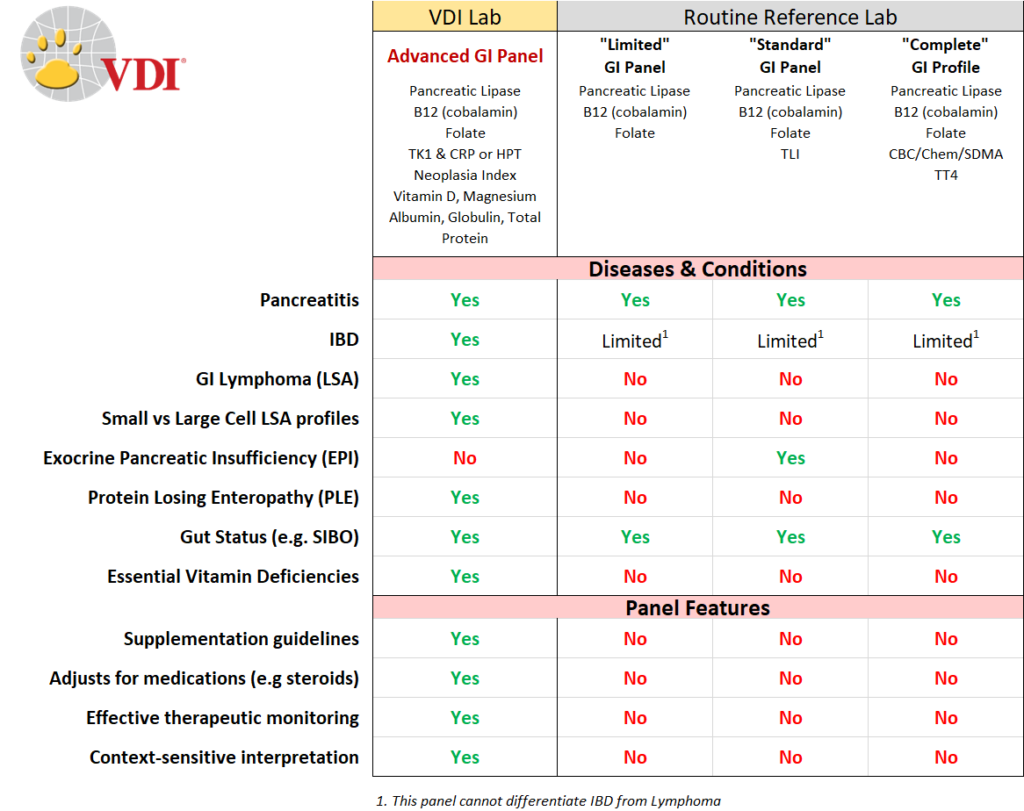
12+ Parameters – One Panel
| PARAMETER(S) | GI PROCESS MEASURED | VDI vs OTHER OPTIONS |
|---|---|---|
| Thymidine Kinase (TK1) | Dysregulated Cell Proliferation | VDI exclusive test |
| CRP (dog), HPT (cat) | Inflammation | High sensitivity, species specific |
| B12, Folate | DNA & protein synthesis, Absorption, GI flora | Expanded range, patient specific supplementation |
| Neoplasia Index® (NI GILSA) | Cancer Proliferation | VDI exclusive test |
| cPL (dog), fPL (cat) | Pancreatic enzymes | Quantitative |
| Total Protein, Albumin, Globulin, A/G | Fractional protein loss | – |
| Vitamin D, Magnesium | Absorption, immune regulation | Patient specific supplementation |
| Age | LSA risk factor | VDI exclusive integration |
| Corticosteroids | Disease process modifier* Anti-inflammatory, anti-proliferative | VDI exclusive integration |
Optional Integrations
The Advanced GI Panel has three additional test integrations that examine conditions which may be involved. They can be tested at the same time as the base panel, or added on afterwards to give a more complete picture of what’s going on with a patient presenting with GI signs.
| PARAMETER | PROCESS TESTED | VDI vs OTHER OPTIONS |
|---|---|---|
| Allergies (IgE) (up to 125 allergens) | Food or environmental allergens causing GI signs or other signs | Only requires 0.2 mL serum. Low cost |
| Cortisol | Addison’s Disease | – |
| ALT, ALP | Cholangitis | – |
Intelligent Interpretation
All VDI testing is performed with fully automated equipment achieving high levels of precision and accuracy. The results of these tests, along with age, signalment, and context are then filtered through our proprietary AI to provide differential diagnosis for a range of the most common GI diseases seen in cats and dogs.
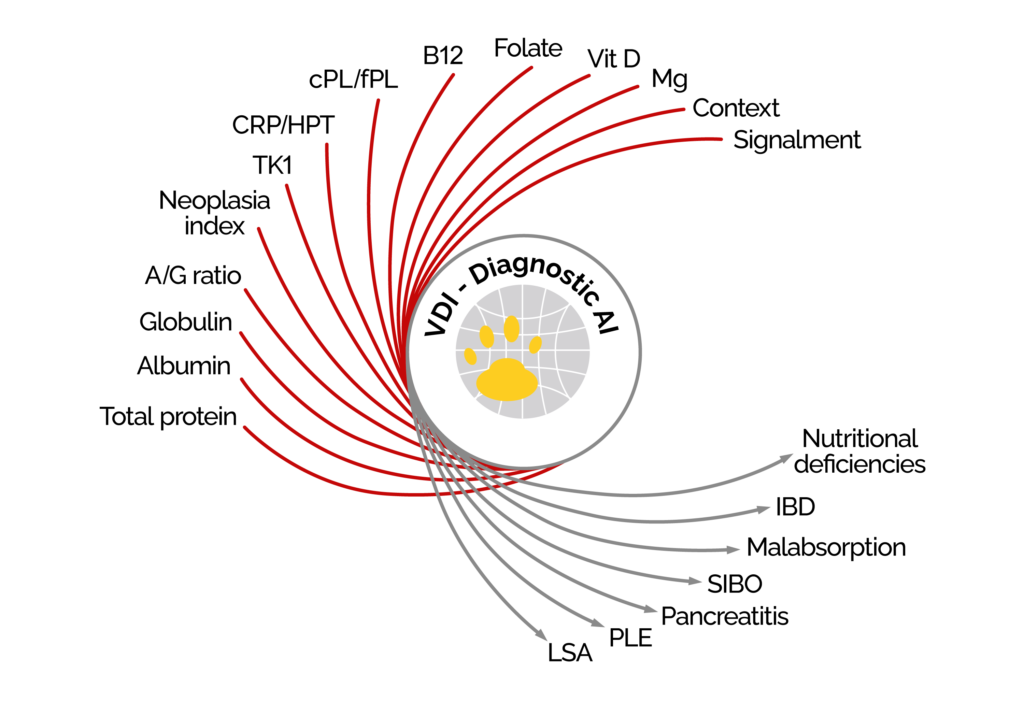
Applications
The Advanced GI Panel aims to answer your real question: What is wrong with my GI patient? By integrating multiple tests (often ran through separate labs) with VDI’s unique GI Lymphoma Panel, VDI is able to provide diagnostic insight into:
- Lymphoma vs IBD vs food-related
- Pancreatitis
- Protein Losing Enteropathy
- Nutritional deficiencies
- Malabsorption & SIBO
- Food & Environmental Allergens
- Addison’s disease
- Cholangitis
Context Aware
VDI integrates case context, medications, and signalment into the diagnostic AI to improve results interpretation, adding confidence to the diagnoses. Let us take some of the work off your shoulders and simplify the complex interpretations.
Clinical Review
Every Advanced GI Panel undergoes clinical review of any relevant information provided on the requisition form to ensure all interpretations are context-sensitive and patient-centric.
Patient-Centric
Actionable items start with patient-specific test interpretation and recommendations that are unique to the individual. For all essential vitamin tests, VDI provides individualized dosing recommendations to correct deficiencies.
GI Lymphoma Panel – included with the Advanced GI Panel
- Application specific Neoplasia Index® resulting in better Sensitivity/Specificity, especially with Small Cell LSA.
- Indicates if LSA is more likely: Large Cell, Small Cell, or Thoracic.
- B12/Folate report provides additional information on status of the GI tract.
Scroll down to learn more on the Neoplasia Index®.
Considerations
The Advanced GI Panel utilizes disease activity markers that respond to changes in disease state. Use of anti-inflammatory medications like NSAIDS/Corticosteroids and Chemotherapy may impact results, however this does not eliminate the utility of the panel.
Contact VDI for further information regarding the impact of medication on results. All VDI Cancer & GI Panels can be used to monitor the effectiveness of therapy and disease progression.
The Neoplasia Index®: NI GILSA
The Neoplasia Index® is the primary test value used in the diagnostic workup of the GI patient
Neoplasia Index® (NI GILSA)
The Neoplasia Index® (NI) is meant for the diagnostic rule-in of cancer. Developed as a general cancer marker used in the VDI Cancer Panel, the NI is the primary value used for differential diagnosis of cancer. The NI is unit-less index from 0-10 with 0 being a perfectly normal animal, to 10 being a perfect score for cancer.
Combining independent markers into a unified algorithm improves performance. The base Neoplasia Index® incorporates Thymidine Kinase Type 1 and C-Reactive Protein for dogs or Haptoglobin for cats as a general cancer rule-in.
The expanded NI GILSA, is a specific application for GI lymphoma. It incorporates TK1, CRP/HPT, B12, Folate, and Age. These markers look at the interplay of dysregulated proliferation, inflammation, DNA synthesis, and intestinal damage to identify between IBD, LSA, and even pancreatitis. As seen below, the NI GILSA, separates groups remarkably well and is able to provide guidance between small cell, large cell, and non-GI LSA.
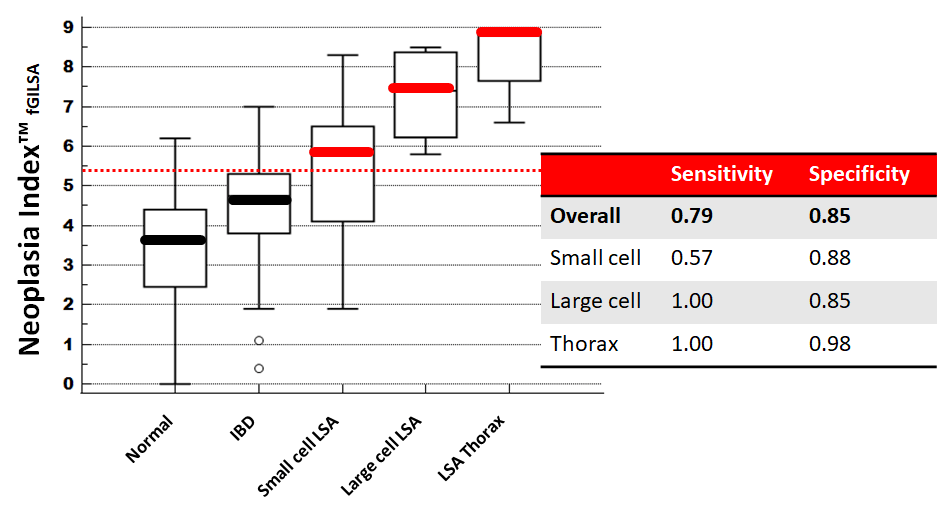
Profiles in the untreated patient
In the untreated cat, the levels of TK1, CRP/HPT, and B12 can indicate different disease states commonly associated with that specific marker profile. Below are some examples of the profiles in the GI cat that are indicated when the resulting markers are increased, decreased, or normal.
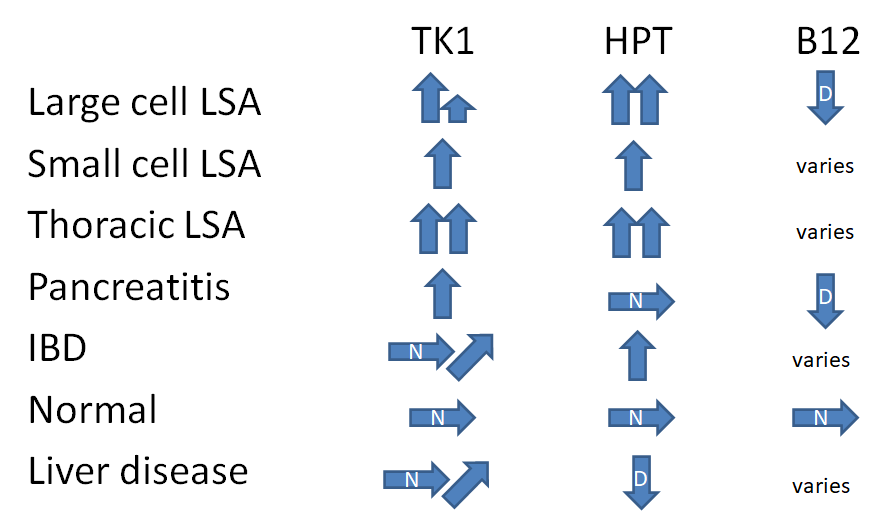
Lab Report Samples (GI Lymphoma Panel only)
View some samples of actual lab reports by clicking on the images below.
Pancreatitis, PLE, Dietary
The Advanced GI Panel provides diagnosis beyond IBD/LSA
Pancreatitis
The Advanced GI Panel uses the feline/canine pancreatic lipase test (fpL/cpL). While generally a good and widely recognized test, test performance is around 60% sensitive, 90% specific. VDI is able to improve performance by looking at inflammation, dysregulated proliferation, and vitamin deficiency. The report advises the veterinarian on the level of confidence based upon the interplay of these markers.
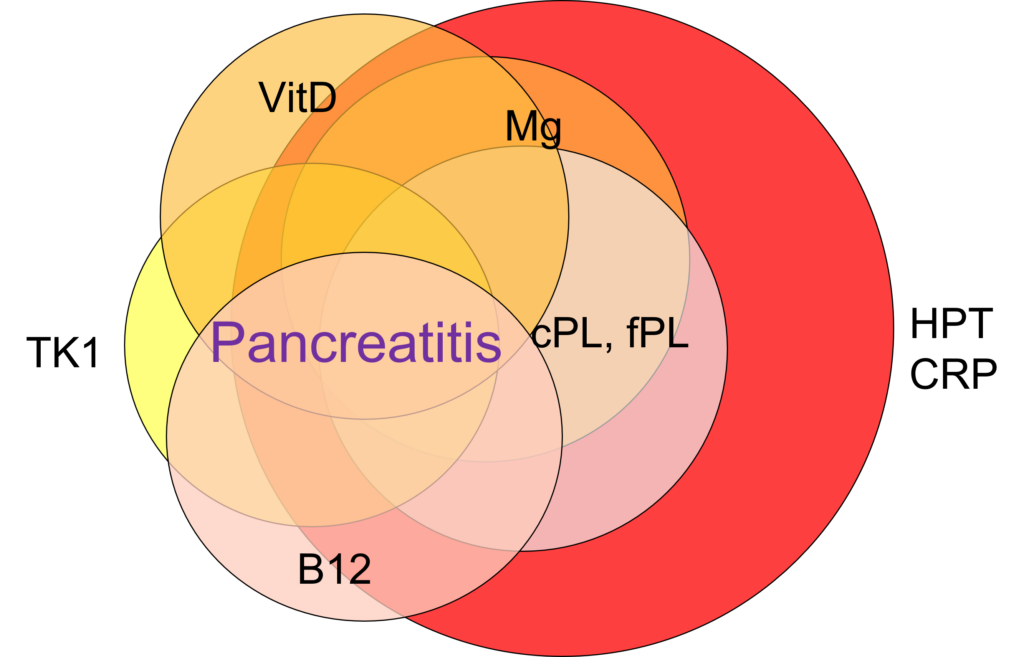
Protein Losing Enteropathy (PLE)
PLE is often diagnosed as the exclusion of other. But with the complexity of GI disease, VDI is able to provide a high degree of sensitivity and specificity by looking at the interplay of serum proteins, inflammation, dysregulated proliferation, and vitamin levels. The consequence of PLE is the constant loss of serum proteins, but it not just the loss of albumin. Albumin binds many other substances and when there is a loss of albumin, there is also a corresponding loss of specific vitamins and minerals. VDI’s pattern recognition can identify these protein losing syndrome patients with a high degree of accuracy.
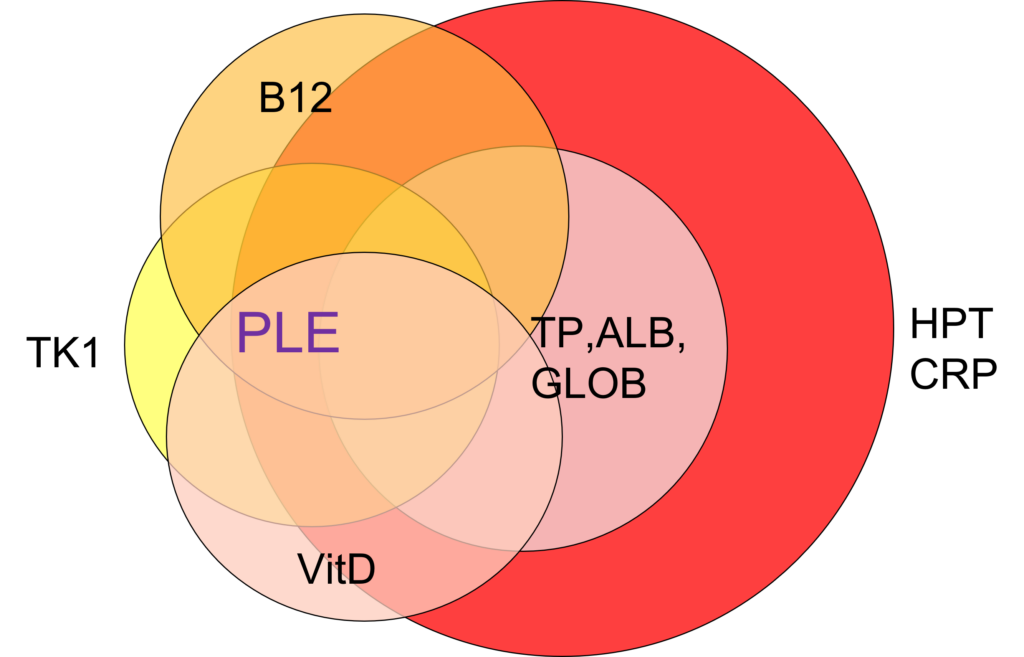
Vitamin Deficiencies
The GI tract is responsible for all nutrient absorption. This includes Vitamin D, the precursor to calcitriol and an important immune regulating hormone, B12, essential for DNA and protein synthesis, and magnesium, an essential element needed in almost every enzymatic reaction in the body. Folate, mostly endogenously made from gut bacteria, along with B12 offer insight into GI pathology due to their different absorption pathways. Together, VDI is able to quickly identify problems and provide patient-specific dosing removing all the guess work from patient treatment.
